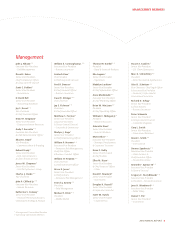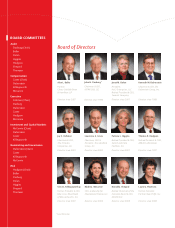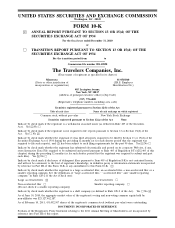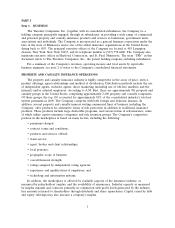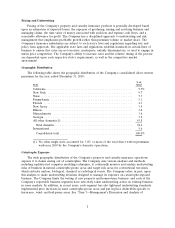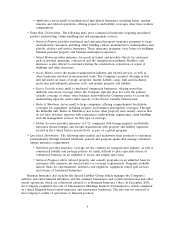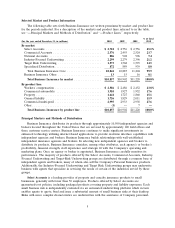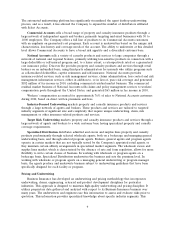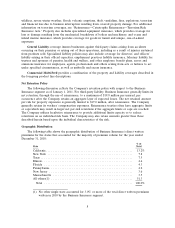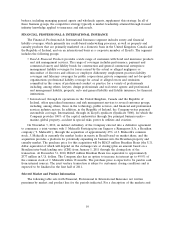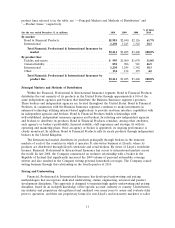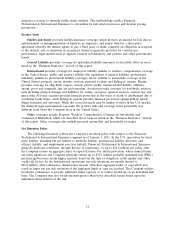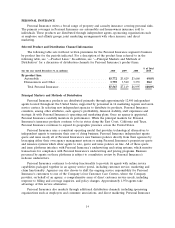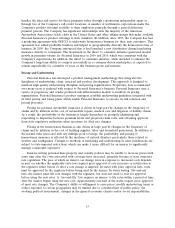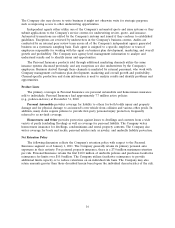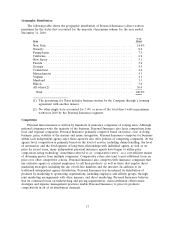Travelers 2010 Annual Report Download - page 19
Download and view the complete annual report
Please find page 19 of the 2010 Travelers annual report below. You can navigate through the pages in the report by either clicking on the pages listed below, or by using the keyword search tool below to find specific information within the annual report.methodology enables Business Insurance to streamline its risk selection process and develop pricing
parameters.
For smaller businesses meeting pre-determined exposure characteristics and thresholds, Select
Accounts utilizes an automated underwriting system that enables agents to issue a significant number of
policies at their desktop.
A portion of business in this segment, particularly in National Accounts and Construction, is
written with large deductible insurance policies. Under workers’ compensation insurance contracts with
deductible features, the Company is obligated to pay the claimant the full amount of the claim. The
Company is subsequently reimbursed by the contractholder for the deductible amount and is subject to
credit risk until such reimbursement is made. At December 31, 2010, contractholder payables on
unpaid losses within the deductible layer of large deductible policies and the associated receivables
were each approximately $5.34 billion. Retrospectively rated policies are also used for workers’
compensation coverage. Although the retrospectively rated feature of the policy substantially reduces
insurance risk for the Company, it introduces additional credit risk to the Company. Premium
receivables from holders of retrospectively rated policies totaled approximately $198 million at
December 31, 2010. Significant collateral, primarily letters of credit and, to a lesser extent, cash
collateral or trusts, is generally requested for large deductible plans and/or retrospectively rated policies
that provide for deferred collection of deductible recoveries and/or ultimate premiums. The amount of
collateral requested is predicated upon the creditworthiness of the customer and the nature of the
insured risks. Business Insurance continually monitors the credit exposure on individual accounts and
the adequacy of collateral.
Product Lines
Workers’ Compensation provides coverage for employers for specified benefits payable under state
or federal law for workplace injuries to employees. There are typically four types of benefits payable
under workers’ compensation policies: medical benefits, disability benefits, death benefits and
vocational rehabilitation benefits. The Company emphasizes managed care cost containment strategies,
which involve employers, employees and care providers in a cooperative effort that focuses on the
injured employee’s early return to work and cost-effective quality care. The Company offers the
following types of workers’ compensation products:
• guaranteed-cost insurance products, in which policy premium charges are fixed for the period of
coverage and do not vary as a result of the insured’s loss experience;
• loss-sensitive insurance products, including large deductible and retrospectively rated policies, in
which fees or premiums are adjusted based on actual loss experience of the insured during the
policy period; and
• service programs, which are generally sold to the Company’s National Accounts customers,
where the Company receives fees rather than premiums for providing loss prevention, risk
management, and claim and benefit administration services to organizations under service
agreements.
The Company also participates in state assigned risk pools as a servicing carrier and pool
participant.
Commercial Automobile provides coverage for businesses against losses incurred from personal
bodily injury, bodily injury to third parties, property damage to an insured’s vehicle and property
damage to other vehicles and other property resulting from the ownership, maintenance or use of
automobiles and trucks in a business.
Property provides coverage for loss of or damage to buildings, inventory and equipment from a
variety of events, including, among others, hurricanes and other windstorms, earthquakes, hail,
7


